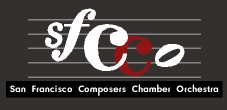| SAN
FRANCISCO COMPOSERS CHAMBER ORCHESTRA |
|
Jan Pusina's compositional career started in the 1960's while he was studying at U.C. Berkeley, with Four Songs on Zen Texts and Tape Composition #1. It continues today in the instrumental and electro-acoustic genres. His recent performances include Pink Wind, by the San Francisco Community Music Center Orchestra, and Furtive Assymptotes by the SFCCO. He has also recently produced a set of computer music pieces, available on request. |
Wind Quartet |
|||
| Anne Baldwin | Veterans' Day | |||
|
Stan McDaniel studied composition with an inspiring teacher and consummate musician named H. Klyne Headley, who (although now forgotten) at that time was quite well known as a composer, conductor and concert pianist. Mr. Headley taught him skills for serious musical composition. Although he pursued a career in philosophy, Stan continued to compose music, bits here and there, and even one or two major pieces over the years, based on further reading and experience as time permitted. Stan made efforts at self-publishing, and in 1965-66 two of his pieces, "The White Tree" and "Estel" (Hope) for solo alto recorder, were received favorably, the first by a laudatory review in The American Recorder magazine (1965) and the second in a letter from the outstanding professional recorder artist Franz Bruggen, who called "Estel" "a real contribution to the modern recorder repertoire." |
Quick Rain |
|||
|
Lisa Scola Prosek is a graduate of Princeton University in Music Composition. Her teachers include Edward Cone, Milton Babbitt, Lukas Foss, and Gaetano Giani Luporini. Scola Prosek is the recipient of numerous grants, commissions and awards, including The NY Center for Contemporary Opera "Atelier" Award for The Lariat. Scola Prosek has composed and produced eight operas with librettos in Italian and English. In 2012, Daughter of the Red Tzar, written for acclaimed tenor John Duykers, premiered in San Francisco to capacity audiences, and is currently on the outreach season with Long Beach Opera. Lisa serves as General Manager and Director of the San Francisco Composers Chamber Orchestra, since 2001. Other awards have been from Theatre Bay Area, the LEF Foundation, The Argosy Contemporary Music Fund, Meet the Composer, the Hewlett Foundation, the American Composers Forum, The San Francisco Arts Commission, The Center for Cultural Innovation, The California Arts Council, the NEA and the Zellerbach Foundation. |
Chilkat |
|||
|
Dr. Mark Alburger (1957-2023, Upper Darby, PA) was an award-winning, eclectic ASCAP composer with postminimal, postpopular, and postcomedic sensibilities. He was the Music Director of SF Composers Chamber Orchestra, SF Cabaret Opera / Goat Hall Productions, and The Opus Project; Editor-Publisher of 21st-Century Music and New Music; Adjunct Professor Emeritus of Music Theory and Literature at Diablo Valley College; and a Musicologist for Grove Online and Grove Dictionary of American Music. His principal teachers were Gerald Levinson and Joan Panetti (Swarthmore College, B.A.); Jules Langert (Dominican University, M.A.); Christopher Yavelow (Claremont University, Ph.D.); and Terry Riley. Dr. Alburger had composed 399 major works, including chamber music, concertos, oratorios, operas, song cycles, and symphonies. His complete catalogue was available from New Music. (markalburgerworks.blogspot.com) |
Don Quixote Prologue from "Camino Real" |
|||
| Flute
Oboe Clarinet Bassoon Alto Sax |
Trumpet French Horn Trombone Piano Percussion Vocalist |
Violin I Violin II Viola Esther Jo Joan Hadashi Bass |


 Dr. Mark Alburger was the Music Director, Conductor, and founder of the San Francisco Composers Chamber Orchestra. Mark was an eclectic American composer known for his postminimal, postpopular, and postcomedic sensibilities. He served as the Music Director of Goat Hall Productions / San Francisco Cabaret Opera, Editor-Publisher of 21st-Century Music Journal, an award-winning ASCAP composer of concert music published by New Music, an Instructor in Music Theory and Literature at Diablo Valley College, a Music Critic for Commuter Times, an author, musicologist, oboist, pianist, and recording artist.
Dr. Mark Alburger was the Music Director, Conductor, and founder of the San Francisco Composers Chamber Orchestra. Mark was an eclectic American composer known for his postminimal, postpopular, and postcomedic sensibilities. He served as the Music Director of Goat Hall Productions / San Francisco Cabaret Opera, Editor-Publisher of 21st-Century Music Journal, an award-winning ASCAP composer of concert music published by New Music, an Instructor in Music Theory and Literature at Diablo Valley College, a Music Critic for Commuter Times, an author, musicologist, oboist, pianist, and recording artist.